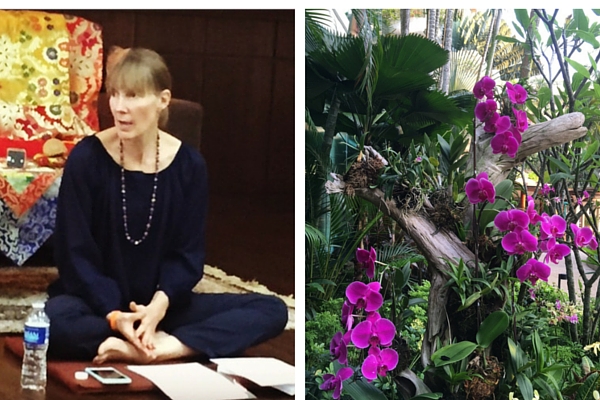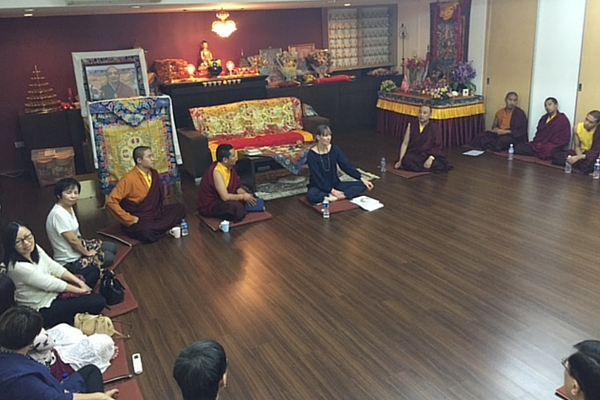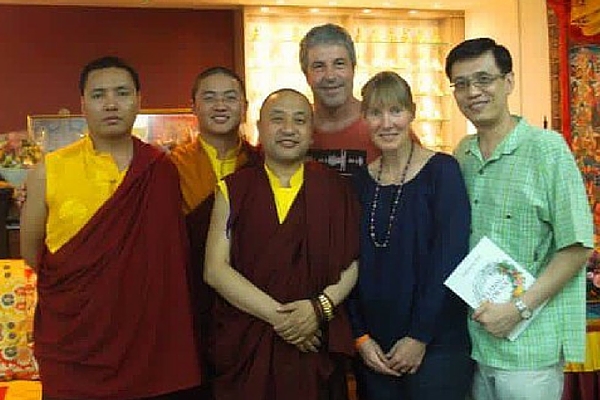This week I am sharing some highlights from my Singapore mindfulness talk. The talk was hosted, on 17 July, by Mahsuka Singapore Buddhist Centre and was well attended by friends of the centre and monks from Serang Monastery, Nepal. The talk, which was translated into Tibetan by Nuptul Rinpoche, explored how Western Science and Eastern wisdom can work together. Mindfulness is central to making choices that best suit your current requirements.
How did my interested in an integrated approach come about?
“I have been a health care practitioner specialising in nutrition, health and wellbeing for over 20 years. I have been fortunate to work with many accomplished health care practitioners, from general medical practitioners, medical specialists as well as Traditional Chinese Medicine (TCM) and Ayurveda doctors. From my experience working in health retreats and integrative medicine centres, and managing my own personal health, I know it is possible to integrate different types of medicine and health care.
Integrative medicine might mean that you see a practitioner trained in different types of health care or you might visit a team of people. Through discussions with TCM and Ayurveda practitioners I have learnt that there are many similarities between Western and Eastern nutrition principles. This is how Eating for You came about.”
Why is mindfulness so important?
“The reason I have focussed on mindfulness, is that it allows us to building confidence in choosing what’s best for us from the ever changing health advice and our own personal changes e.g. change of work, travel or our health needs as we age.”
Mindfulness is the focussing of your attention on the current moment, and being aware of the purpose (of your thoughts or actions) and being compassionate about what you observe.
“Mindfulness calms the mind and increases our clarity and confidence in decision-making. By settling our mind, minimising the distraction caused by our thoughts and emotions, we create space in our mind and our life.”
“From a Buddhist perspective, mindfulness supports our happiness through a calm and compassionate mind. Our mind directs our thoughts, speech and actions. This means that we have the choice whether these are helpful or harmful to others and ourselves. In the case of choosing healthier food, feeling guilty or shameful will not support you to take care of your self. Feelings of self worth will encourage you to invest in our health.”
“Scientific research has shown benefits of mindfulness including:
- Increased self-awareness of our thoughts and actions
- Improved focus and concentration – save time, increase satisfaction and performance
- Decreased stress arising from negative thoughts and feelings – less likely to create and follow these
- Increased compassion towards self and others
- Increased ability to introduce healthy eating and lifestyle choices – make reflective choices rather than automatic ones
- Improved health through the reduction of blood pressure”
What are the similarities between Western and Eastern nutrition?
“Healthy eating is based on your personal health needs, such as increasing your energy, maintaining healthier body weight or managing an illness such as heart disease or diabetes. Other common modern illnesses related to eating and lifestyle choices include:
- Digestion e.g. irritable bowl syndrome
- Mood and mental health disturbances
- Unhealthy body weight”
Health and illness stem from the gut
“A common connection between all of these illnesses, listed above, is the health of our gut. This is of special interest to me, as this concept is the foundation of many Eastern medical systems. Our gut microbiota is a community of bacteria and micro-organisms that live in our intestines. This community has 10 times as many cells as our body.”
“Disruption to the balance of organisms in the gut is referred to as dysbiosis. This has been associated with the conditions already mentioned, as well as:
- Inflammatory bowel disease
- Neurological disorders such as multiple sclerosis
- Allergies such as asthma and food allergy
- Eczema
- Bowel cancer
“A healthy gut is present when the microbiota experience symbiosis (balance). The dietary factor related to symbiosis is DIETARY FIBRE. Gut bacteria ferment dietary fibre producing short chain fatty acids; acetate, butyrate and propionate.
Foods that are most beneficial for our gut are whole foods, green leafy vegetables, foods high in fibre (soluble, insoluble and resistant starch) and fermented foods.”
Balanced eating guidelines
“In my book, Eating for You, I refer to the latest Australian and international guidelines, with the addition of Eastern viewpoints.”
Our starting point for food selection is the same; with plant foods being the foundation of our meals and snacks. We then personalise these choices based on our individual requirements. In Eating for You I provide steps to personalise your way of eating.
Eating with our natural cycles
“Consideration of the natural cycles, including our seasons and circadian rhythm (sleep) is a part of eating and living mindfully. Scientific research is emerging concerning the best times of day to eat. There are a few scientific studies on body weight and diabetes showing the benefit of eating earlier in the day. Eastern medicine encourages us to eat the bulk of our food by 3pm.
Local and in-season food is also recommended. This is not always possible. In Singapore for example, 90% of your food is imported. I understand that local food is being promoted for health and environmental reasons. I encourage people to grow some of their own food. From my initial research growing herbs is possible in Singapore apartments windows and balconies—the minimum requirement is four hours sun a day.”
Healthy eating is part of a balanced Lifestyle
“Our food choices interact with our activity (exercise), our sleep, our relationships with others and our ability to focus and have time for reflection. All of these factors are interrelated. The Eating for You philosophy recommends that all factors be considered.”
We need adequate sleep
“The benefits of exercise have been known for some time. But the role of sleep in our health is emerging as a crucial component for healthy eating —7 to 9 hours of sleep a night is recommended for adults.”
“When we don’t have enough sleep our hormones fall out of balance. Cortisol, a stress hormone increases and over the long term can increase blood pressure, reduce our ability to control blood sugar and increase inflammation. Another hormone, ghrelin, increases making us feel hungrier. At the same time our appetite satisfaction hormone, leptin, decreases. These changes mean we need to eat more to feel satisfied. In addition, we often eat more high fat and high sugar foods. This makes sense to me because the body is tired and it is directing us to eat foods that contain a lot of kilojoules (calories).”
Mindful eating takes all of our needs into consideration
“Mindful eating supports us in combing our health, food and lifestyle knowledge. It also encourages us to explore our motivations or drivers for eating. In practical terms this means knowing why, what and how you eat. For example, do you eat because you are truly hunger, tired or stressed? How might your eating and lifestyle habits be impacting on your health? This process allows you to build clarity about what you need, and the confidence to make decisions and introduce new choices.”
One of the main challenges we face is to uncover whether we are actually eating because we are hungry. During the Singapore mindfulness talk, tuning into our appetite was discussed. If you are interested in reconnecting with your appetite you might like to read an earlier post to increase you ability to tune into your personal appetite cues.
Healthy eating is much more than food – knowing your health and lifestyle requirements and cultivating mindfulness.
Taking care with an integrated approach
“Combining different ways of selecting nutrition and health can work if it is done in a planned way. I recommend that it is done in partnership with your healthcare practitioners. This is important because different medications, herbs, supplements and nutrients in food interact with one another. You might be spending a lot of money and getting no benefit, or in some cases doing harm, because of drug-nutrient, drug-herbal interactions. So there is a caution here.”
An integrative approach to health requires you to work with your health care practitioners and keep them up to date with your treatments, supplements and how you are feeling.
I am thankful to Mahsuka Singapore for hosting the Mindful Eating and Living Talk, and to Nuptul Rinpoche for his oral translation into Tibetan. The proceeds from Eating for You books sold at the Singapore mindfulness talk were directly donated to the Orgyen Ling project. This project is being coordinated by Nuptul Rinpoche and includes the building of non-sectorial school for children, a retreat centre, Buddhist university and monastery. If you would like to make a donation to the school project, please visit my fundraising campaign at Orgyen Ling Children’s School Nepal.
Thank you to Lee Kwang Boon and Dennis Pisk for the photos


